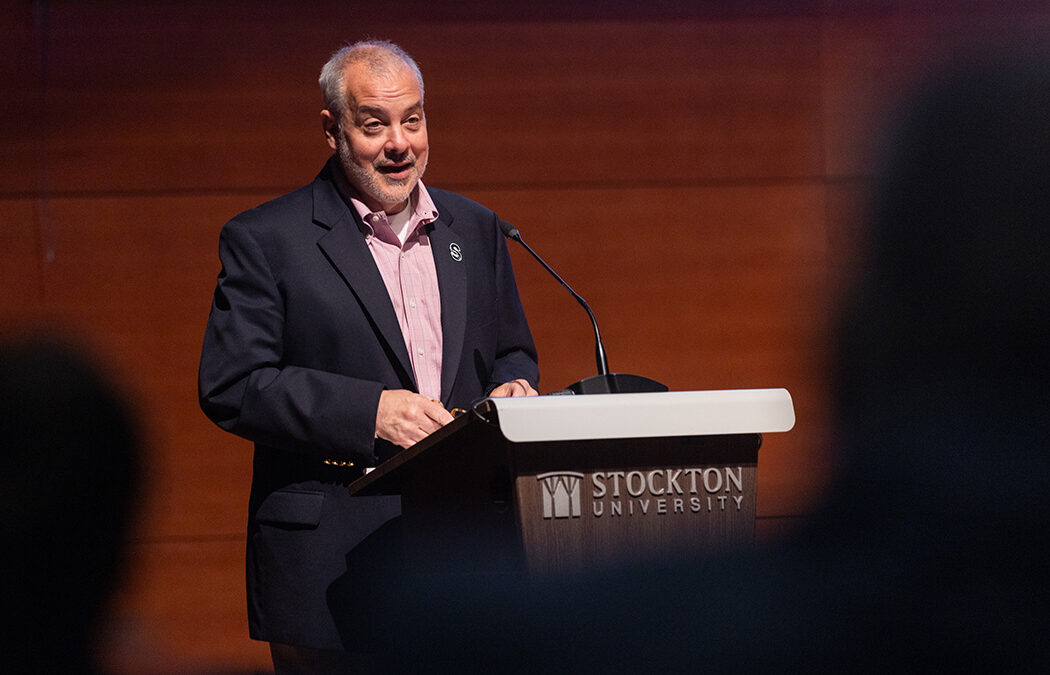President Joe Bertolino announced Stockton University’s new Strategic Plan focusing on strengthening community and advancing excellence during his third annual State of the University address on Oct. 6.
“This is not just a plan, it’s a moral imperative,” Bertolino said. “A responsibility for our community that is grounded in our values, aligned with our mission and focused on what matters most. It sets a clear direction for Stockton’s next chapter.”
The plan centers on five strategic priorities, including Cultivate a Community of Care, Inspire Minds, Empower Student Success, Anchor in Purpose and Sustain Tomorrow.
A community of care is built on connection, shared purpose and inclusive engagement, Bertolino said. The university will improve campus climate by implementing the recommendations of the Campus Morale Working Group.
“We will foster connection, dialogue and belonging in every part of campus life,” he said. “And we will use feedback to guide growth and leadership.”
The university will inspire minds through teaching, learning and scholarship with the teacher-scholar model as the focus, Bertolino said. The university will also place an emphasis on keeping programs relevant, rigorous and student-centered.
“We will support faculty as teachers and scholars, making sure research and creative activity enrich student learning,” he said. “We will expand innovative, hands-on programs that prepare students for the future.”
Stockton will empower students’ success by strengthening career readiness and prioritizing the physical and mental well-being of students, Bertolino said.
“We will expand global awareness and engaged citizenship, giving students the tools to navigate a diverse world,” the president said. “And we will advance faculty and staff development to support student success, making sure every division is aligned around this priority.”
Bertolino said the university takes its role as an Anchor Institution seriously, not just in Atlantic City but in Atlantic County and South Jersey. He said the university plans to invest in workforce and economic development and share research and resources locally and globally “to address challenges that matter.”
“We will broaden access and opportunity across the region and beyond, ensuring Stockton’s impact extends well past our campus borders,” he said.
For the final point of the plan, Bertolino emphasized that Stockton will continue to be innovative and develop new enrollment and retention plans to remain strong in a competitive higher education market and sustain the future of the university.
“We will expand and diversity revenue sources to build stability. We will strengthen financial planning and reserves to prepare for the long term,” he said. And we will enhance efficiency and cost management to use resources wisely.”
That competitive higher education market is just one of the challenges the university faces in a complex and often uncertain world that includes global conflict and injustice and a polarized political climate that is placing an emotional toll on students, staff and faculty, Bertolino said.
“Higher education, our work, is being questioned in ways we haven’t encountered before. The value of higher education itself is under scrutiny,” he said. “We face legislative pressure, funding threats, and a deep skepticism of the very principles that define our mission.”
But Bertolino said he wants to be clear that the university will be resilient, standing for academic freedom, civil discourse, inclusivity and student support.
“At Stockton, we do not adapt our values to fit the moment. We stand by them, always,” he said. “So, as we name the challenges around us, we also recognize the responsibility we carry — to move with intention and to lead with purpose.”
The president added that the university has laid some important groundwork in the first two years of his term by reshaping academic leadership, securing new grants for research and deepening Stockton’s investment in student wellness.















